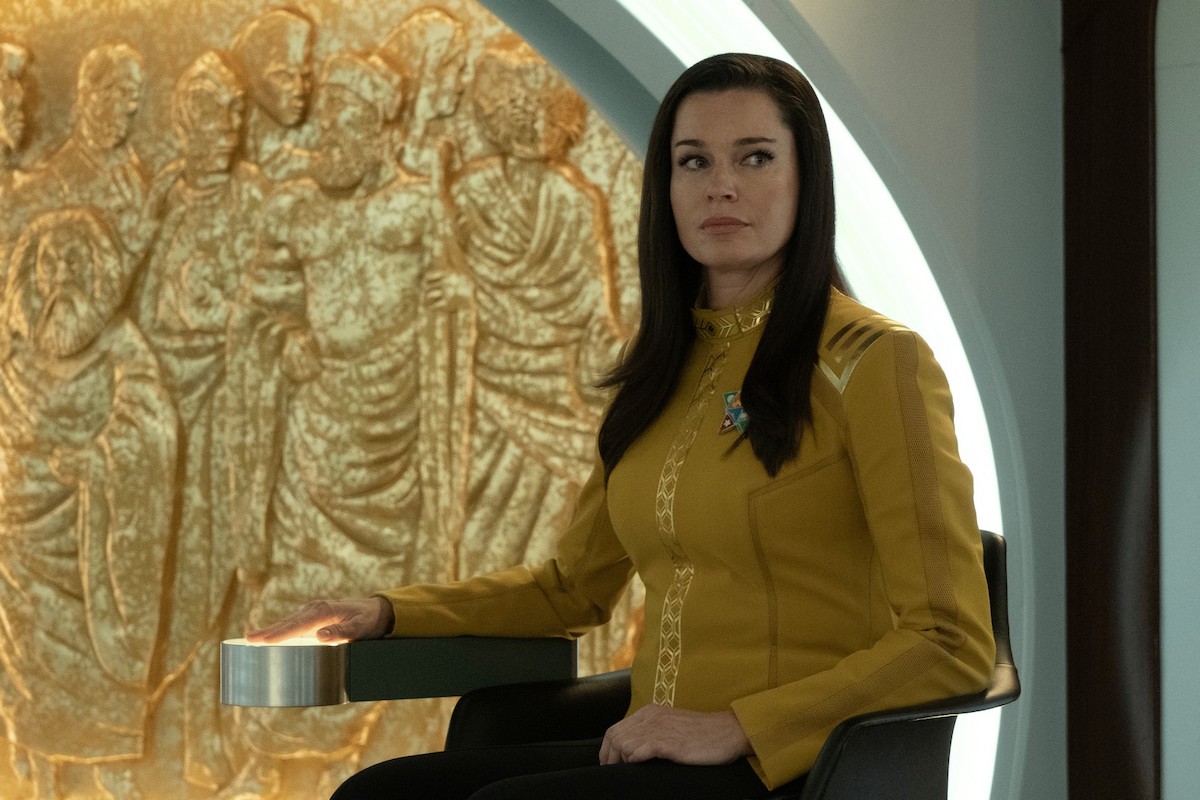‘Strange New Worlds’ “Ad Astra Per Aspera” Reminds Me of My Other Favorite ‘Star Trek’ Courtroom Drama

Season 2, episode 2 of Star Trek: Strange New Worlds, “Ad Astra Per Aspera,” is the culmination of a plotline that simmered all through season 1: Una Chin-Riley‘s trial for being a genetically modified Illyrian.
The Federation has a law against genetic modification, and after her arrest at the end of season 1, Una is put on trial for failing to disclose her status in her Starfleet application, and joining Starfleet as an Illyrian. In the Federation, it’s not just illegal to modify oneself—it’s illegal to be genetically modified, even if it was done to someone as a child. If you think it’s wrong for a government to declare you illegal for simply being what you are, then you’ve hit on the problem at the heart of Una’s case.
To defend Una, Captain Pike hires Neera (Yetide Badaki), an Illyrian who’s one of the best civil rights lawyers in the known galaxy—and Neera uses the case to hit back at the bigotry underlying Starfleet’s anti-modification laws. Captain Batel (Melanie Scrofano), who’s serving as Starfleet’s prosecutor, argues that genetic modification is dangerous. Taken to its extremes, she argues, the practice leads to atrocities like the Eugenics Wars, which left countless people dead. Batel implies that the problem isn’t any specific harm that Una has done by serving in Starfleet. Rather, it’s the hypothetical harm that her existence could lead to in the future. It’s so important to prevent this hypothetical future harm, Batel’s case goes, that Starfleet has to punish Una by imprisoning her for decades.
Any reasonable person can see the flaws in that logic. However, prejudice and bigotry only ever wear the veneer of rationality. You see the same slippery slope arguments against immigrants, people of color, disabled people, and LGBTQ+ people. What if no cis female athlete can ever get a sports scholarship again? What if immigrants open the floodgates for terrorists and gangs? What if, what if, what if!?
Sure enough, Neera’s legal strategy reveals that Starfleet’s fear of Illyrians really is rooted in bigotry. During her testimony, Una talks about the slurs and violence that she suffered as a child. She reveals that she nearly died of infection when her family was afraid to take her to a non-Illyrian doctor, and that later, they all fled their home, looking for safety. Una and Neera win the case on a technicality when Neera is able to argue that Pike offered Una asylum, but both she and Una leave with the hope that their victory will chip away at the Federation’s anti-Illyrian laws.
“Ad Astra Per Aspera” continues a Star Trek tradition
Star Trek has always had great courtroom episodes. There’s The Next Generation‘s “The Drumhead,” in which an apparent act of sabotage reveals a strain of fanaticism within Starfleet. There’s the original series’ “The Menagerie,” which introduced the first incarnation of Captain Pike after the original pilot was scrapped. My personal favorite, though, is “The Measure of a Man.”
In this episode, Data finds out that he’s going to be forcibly experimented on, so that Starfleet can better understand androids and eventually build more. When Data objects, Starfleet officials tell him he’s a machine, and thus has no rights. In the resulting trial, Data and Picard are forced to prove that he’s a sentient being, delving into the nature of sentience and casting doubt on Starfleet’s supposed progressiveness. If Starfleet is willing to enslave a being all his potential descendants, then is the Federation any better than some of the more barbaric cultures that came before it? Just as in Una’s trial, those in power are forced to reevaluate their beliefs when they come face to face with the person whose fate they’re so cavalierly toying with.
Like Federation citizens, Star Trek audiences love Starfleet because of its ideals, and the utopian possibilities it represents. However, Star Trek is at its most compelling when it reveals Starfleet’s failures to live up to those ideals. Starfleet still has a long way to go before it reaches the perfection it’s striving for, and it’s satisfying when our plucky heroes get a chance to push it a little farther along.
(featured image: Paramount+)
Have a tip we should know? tips@themarysue.com